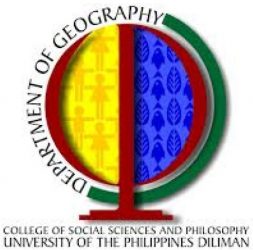
The Master of Science (Geography Program) reflects the Department’s vision for Geography graduate students, who upon the completion of the program should be able to apply geographic concepts, theories, and approaches in a holistic and integrative way in addressing contemporary issues and problems at local, national, and global scales. With emphasis on interdisciplinary research and the Department’s thrust toward public service and extension, the MS Geography program employs critical approach toward the spatial understandings of space, place, and landscape, which is complemented by methods courses to equip graduate students with the fundamental, conceptual, and practical tools needed for developing ethical and innovative research and/or service-learning engagement.
The graduate program offers students a wide array of theoretical and applied specializations that are relevant to Philippine development goals and to the challenges of a globalized world.
The advanced curriculum includes courses in the theoretical foundations of the discipline, spatial analysis, human and cultural geography, natural hazards and disaster management, environmental resource management, urban ecology, regional geographic planning, population geography, and geographic information science (GIScience), that can leverage student employability in different job sectors. These courses are geared to equip students with the necessary skills in doing research activities as they work to analyze and solve the physical and socioeconomic problems of our societies.
Graduate students can also be affiliated with existing research groups.
MSc Geography Course Description
The following are the courses under the MS Geography program (View PDF version here):
GEOG 202. Field Geography. Training in methods of geographic fieldwork for advance students who have not had a field course in geography. (one summer, place to be announced later on). 6 units
GEOG 204. Geographic Thought. Concepts, approaches and debates in the evolution of geographic thought. Prereq: None. 3 units. Lecture
GEOG 209. Spatial Analysis. Methods & concepts of regional and interregional analysis. Prereq. GS, Stat 101/equiv. 3 units
GEOG 210. Marine Geography. Man & the sea; oceanic climate & landforms; regulation & control of the utilization of the sea & sea bed. 3 units
GEOG 211. Seminar in Geography Important contemporary literature & problems in geography. Prereq: GS/SS. 3 units (maximum credit allowed – 6 units)
GEOG 212. Applied Climatology Regional genesis & dynamics of climate & its effects on resource development. Prereq: GS. 3 units
GEOG 213. Agricultural & Soil Geography. Distribution, variation & significance of the different types of soils & agricultural systems. Prereq: GS/SS. 3 units
GEOG 214. Industrial Geography. Location theories & analyses concerned with industrial development. 3 units
GEOG 222. Problems of Economic Geography. Problems, methods and techniques of geographic study and research with emphasis on resources, agriculture, settlement, minerals, manufacturing, transportation, and recreation. Prereq: GS. 3 units
GEOG 223. Geography of South Asia. The lands and peoples, climate, relief, resources and economic activities of India, Pakistan, Ceylon, Nepal, Sikkim and Bhutan, and Afghanistan. Prereq: GS/SS. 3 units
GEOG 226. Cultural Geography. Concepts, theories and debates in cultural geography. Prereq: GS. 3 units
GEOG 228. Population Geography. Population distribution in relation to natural resources and economic development. Prereq: GS/SS. 3 units
GEOG 231. Geography of East Asia. The natural and human resources of China (including Taiwan), Korea, and Japan; the influence of these resources in the development of these countries. Prereq: GS/SS. 3 units
GEOG 235. Geography of Southeast Asia. The natural and human resources of Malaysia, Burma, Indonesia, Thailand, Vietnam, Laos, Cambodia, and the Philippines and their roles in world affairs. Prereq: GS/SS. 3 units
GEOG 241. Applied Geography I. Principles, problems, and strategies of regional geographic planning. GS/SS. 3 units
GEOG 242. Applied Geography II. Concepts of regional geographic planning in developing countries. Prereq: Geog 241. 3 units
GEOG 243. Geographic Information Systems Applications in the Social Sciences. 3 units
GEOG 244. Geospatial Technologies and GIS Project Management. The design, planning, and execution of GIS projects through the integration of geospatial technologies, and related ethical concerns. Prereq: None for MS Geography students; COI for Non-MS Geography students. 5 h. (2h lec, 3h lab) 3 units. (2 u. lec, 1 u. lab).
GEOG 245. Island and Archipelagic Geographies. Concepts, theories, discourses and debates on island and archipelagic studies. Prereq: COI. 3 units
GEOG 246. Geohumanities. Concepts, theories and spatial practices between geography and arts and the humanities. Prereq: COI. 3 units
GEOG 255. Geography of Disasters and Disaster Risk Reduction and Management. Theories, concepts, and discourses in disaster studies, and practice of disaster risk reduction and management (DRRM) at various scales. Prereq: COI. 3 units
GEOG 291. Geographic Aspects of Philippine Economic Development. 3 units
GEOG 292. Cultural and Population Geography of the Philippines. 3 units
GEOG 293. Cultures of Mapping and Countercartographies. Concepts, theories and discourses on multiple mapping practices. Prereq: COI. 3 units
GEOG 299. Research Design in Geography. Development of geographic research design and proposal. Prereq: Geog 204 Geographic Thought. 3 units
GEOG 300. Master’s Thesis. 6 units
GEOG 301. Environmental Geography. Component of the physical geographic environments, their integration & problems. 3 units
GEOG 321. Urban Systems. Physical development of city systems & related morphological patterns. 3 units
GEOG 400. Doctoral Dissertation. 12 units
